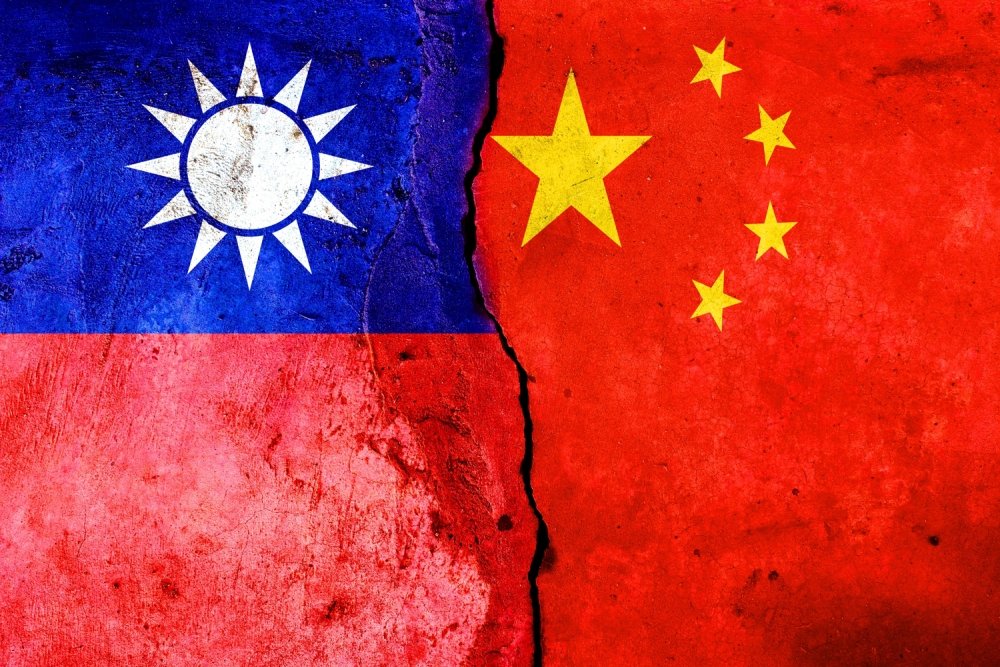
Should the US Be Willing to Go to War to Defend Taiwan?
Mike Bebernes / Yahoo News
(October 13, 2021) — For the past 70 years, Taiwan has existed in a geopolitical gray area. Internally, it governs itself like an independent nation, complete with a strong economy and thriving democratic system. But China has always insisted that the island is part of its territory, a stance that has made other world powers hesitant to recognize Taiwan’s sovereignty.
Chinese leaders have long expressed a desire to bring Taiwan, which sits about 100 miles off China’s coast, back under the full control of the mainland communist government. President Xi Jinping reiterated China’s commitment to “reunification” in a speech over the weekend. Xi repeatedly said he sought a “peaceful” way to bring Taiwan back into the fold, but some global affairs experts believe the threat of a military invasion is becoming increasingly likely.
For decades, the United States has pursued a policy of “strategic ambiguity” when it comes to Taiwan, building an economic and military partnership with its government while still officially recognizing China’s claim that the island is part of its territory. Part of that ambiguity involves never providing a definitive answer to the question of whether the US would be willing to use military force to defend the island if China launched an invasion.

Why There’s Debate
America’s noncommittal position on Taiwan has helped maintain a shaky status quo for many years, and the Biden administration has said it intends to continue the strategy. But worrying signs about the possibility of China trying to take the island raises a question that could someday demand a concrete answer: Is the US willing to go to war with China to protect Taiwan?
Some lawmakers and policy analysts have called on President Biden to make a commitment to use military force to stop a potential Chinese invasion, in part because they believe doing so is the best way to prevent one from happening. They argue that no Chinese leader would dare attack Taiwan if they were certain it would spark a war with a world superpower. Some also argue that Taiwan is too strategically important for the US and its allies to allow it to fall under Chinese control if deterrents failed.
Others say, regrettable as a Chinese invasion would be, it’s not worth risking conflict with China to defend the island’s independence. Limited actions over Taiwan, they argue, could easily escalate into a full-scale war that could cost countless lives and threaten the global order. Some military experts also believe the US would probably lose a battle to defend Taiwan, meaning thousands of American soldiers could die without changing the outcome.
What’s Next
President Biden has reportedly agreed to hold a virtual summit with Xi before the end of the year. China’s continued pressure campaign against Taiwan will likely be among the many contentious topics discussed by the two leaders.

China conducting military exercises in the South China Sea.
Perspectives
A firm commitment to defend Taiwan is the best way to prevent an invasion
“The United States needs to remove the ambiguity about whether it would come to Taiwan’s defense. Uncertainty about US intentions raises the risk of war. … President Biden should declare that, though we will not support a Taiwanese declaration of independence from China, we will defend the island if it is attacked.” — Max Boot, Washington Post
The US must accept it has nothing to gain from defending Taiwan
“Bluntly put, America should refuse to be drawn into a no-win war with Beijing. It needs to be said up front: there would be no palatable choice for Washington if China finally makes good on its decades-long threat to take Taiwan by force.” — Daniel L. Davis, defense priorities senior fellow, Guardian
The US should maintain its noncommittal position as long as it can
“As a superpower, the United States should preserve flexibility in its global security relationships. It also is not even obvious that Taiwan’s body politic would welcome an explicit security guarantee from the United States.” — Therese Shaheen, National Review
Taiwan is too important to US interests to let it be taken by the Chinese
“Abandoning Taiwan in the face of a Chinese military assault would be a monumental disaster. … The US cannot afford to see a country that occupies vital strategic space in the Western Pacific subdued by Beijing.” — Hal Brands, Bloomberg
War with China would pose an existential threat to the US
“Stumbling into a shooting war over Taiwan is akin to opening a Pandora’s box, and it would make the last 20 years of conflict in the Middle East look like an uneventful peacekeeping mission. A fight between Washington and Beijing could also escalate to the nuclear level, particularly if the Chinese Communist Party determines that the use of such weapons is the only thing standing in the way of a humiliating defeat.” — Daniel R. DePetris, NBC News
America has a duty to protect the free world from authoritarianism
“The United States and its allies have built and defended a rules-based system over the past 75 years that has produced unprecedented peace, prosperity, and freedom globally. I don’t want to trade that in for a world in which Americans stand by as revisionist autocracies like China gobble up neighbors by military force.” — Matthew Kroenig, Foreign Policy
The US also has diplomatic tools to deter China from invading
“To further demonstrate US resolve, Biden should tell Beijing that any more threats of force against Taiwan’s participation in the democracy summit will trigger immediate diplomatic recognition of Taiwan and an official statement of Washington’s new ‘One China, One Taiwan’ policy. Beijing must understand that war would mean instant Taiwan independence.” — Joseph Bosco, The Hill
The best way to defend Taiwan is through investment, not military threats
“Hyping the threat that China poses to Taiwan does Beijing’s work for it. Taiwan’s people need reasons for confidence in their own future, not just reminders of their vulnerabilities. If American policy makers want to help Taiwan, they will need to go beyond focusing on the military threat. They need to modernize the US-Taiwan economic relationship, help Taiwan diversify its trade ties and provide platforms for Taiwan to earn dignity and respect on the world stage.” — Richard Bush, Bonnie Glaser and Ryan Hass, NPR
Democrat Calls for War with China

Rep. Elaine Luria (D-VA) is a 20-year Navy vet and
vice chair of the House Armed Services Committee.
Marcy Winograd
(October 11, 2021) — Here’s what Rep. Elaine Luria (D-VA) wrote in her OpEd, published in the Washington Post today: “Congress must untie Biden’s hands on Taiwan.” (scroll for the text)
Earlier this year, during hearings before the House and Senate, current and former commanders of our forces in Asia indicated that China might take military action against Taiwan in the next six years. Already, tensions across the Strait of Taiwan are rising rapidly with incursions by a record number of Chinese aircraft.
In response, the Taiwanese foreign minister said last week that Taiwan is preparing for war. The Biden White House continues to affirm America’s long-standing commitment to a democratic Taiwan as “rock solid.” And we know now that US Special Forces and Marines have been operating as trainers in Taiwan for at least a year.
As members of Congress crafted this year’s defense budget, we took steps to build more ships than we decommission, accelerate the construction of submarines, add additional aircraft and bolster our investment in the Pacific Defense Initiative.
The problem is: We must have both the force with which to deter the Chinese and the legal authority to employ it. And right now, we do not.
No amount of rhetoric or military spending will stop the Chinese if Beijing is intent on taking Taiwan by force because of one simple fact: Under the War Powers and Taiwan Relations acts, the president has no legal authority, without the express authorization of Congress, to use military force to defend Taiwan.
The legal limitations on a president’s ability to respond quickly could all but ensure a Chinese fait accompli. Simply put: The president has no legal authority to react in the time necessary to repel a Chinese invasion of Taiwan and deter an all-out war.
According to the Taiwan Relations Act, adopted in 1979, “the President and the Congress shall determine in accordance with constitutional processes, appropriate action by the United States.” But without congressional authorization, the War Powers Act limits the president’s ability to respond only in cases in which an “attack upon the United States, its territories or possessions, or its armed forces” has occurred. Waiting to seek congressional approval until after China acts would likely cause an insurmountable delay in responding to a hostile action by China to seize Taiwan militarily.
Without the ability for the president to react immediately, any delay would prevent the United States from responding, at a lower level of conflict, to repel an invasion and de-escalate the situation. In 2001, President George W. Bush replied to an interview question about whether the United States had an obligation to defend Taiwan, “Yes, we do, and the Chinese must understand that.” At the time, the then-senior senator from Delaware, Joe Biden, excoriated him in The Post: “The president should not cede to Taiwan, much less to China, the ability automatically to draw us into a war across the Taiwan Strait,” Biden wrote.
Times have changed, and Biden is now president, and he should consider the severe limitations on his ability to respond to an invasion of Taiwan.
My Republican colleagues introduced the Taiwan Invasion Prevention Act in February to grant the president the authority to act against an invasion of Taiwan and prevent a fait accompli.

This act is a good starting point to address a legal dilemma. The act does not change the “One China” policy in effect for 40 years. It does not require the president to act, but rather grants the commander in chief the necessary authorities for decisions to be made in hours, not the days or months congressional debate may take. That could be the difference between limited conflict and global war. This legislation is a starting point for debate, not a finished product.
If the president’s hands remain legally tied in preventing Chinese military action against Taiwan, then an even larger conflict with China is most certainly assured — resulting in potentially disastrous loss of life on both sides and plunging the global economy into recession for a generation. The time for this debate in Congress is now, not when conflict occurs.
As Woodrow Wilson International Center fellow Michael Kofman writes, “Chinese leaders either believe they will have to fight the United States for Taiwan, or they do not.” It is time to untie the hands of our president so that he can, in fact, carry through with the “rock solid ” commitment to Taiwan if actions by China require it.
ACTION: Please write to Fred Hiatt, the editor of the Washington Post Opinion section, to urge the newspaper publish a column refuting Rep. Elaine Luria’s (D-VA-3) OpEd, “Congress must untie Biden’s hands on Taiwan” in which she argues Congress must give Biden the green-light to go to war with China over Taiwan. Demand a rebuttal column from someone with gravitas.
— Marcy Winograd, Coordinator, CODEPINK.
Posted in accordance with Title 17, Section 107, US Code, for noncommercial, educational purposes.